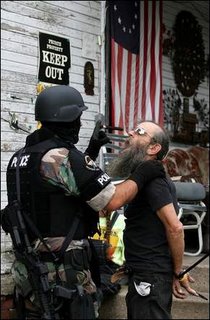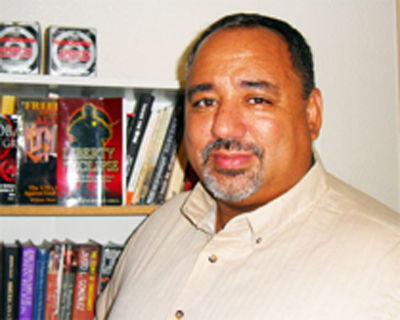Support Your Local Police (State)?!?

Roughly a dozen years ago, my colleagues and I at The New American magazine (please subscribe) published a seminal special issue entitled “Toward A Police State.”
At the time of its publication, less than a year had passed since the Waco holocaust, and the Clinton administration was moving quickly to centralize and militarize law enforcement and to place new restrictions on personal firearms ownership. The concerns expressed in our special issue resonated with those of millions of reasonable and law-abiding Americans.
Almost exactly a year later, the Murrah Building in Oklahoma City was bombed by a deranged former federal employee named Timothy McVeigh (and “others unknown” who remain at large), resulting in another escalation in the campaign to consolidate and militarize law enforcement.
Little need be said about the quantum leap in the direction of the garrison state that occurred after September 11, the Day Everything Changed. Under the reign of Bush the Dumber, the president claims the right to set aside all constitutional and due process guarantees by invoking his supposed powers as a “war president.”
This purportedly includes the power to imprison people without trial, to order torture or assassinations, to conduct open-ended surveillance without warrants or judicial review, and — if legislation pending before Congress passes — to mobilize the National Guard of the various states without consulation with, or a request from, governors or state legislatures.
The placid indifference with which the flying public has accepted new travel restrictions will abet additional invasions of privacy and impositions on personal dignity. In the likely event of another terrorist attack, it’s likely that we will see the country go into lock-down, as at least a few Homeland Security officials have indicated.
But even before a precipitating event of that sort, it’s worthwhile to ask — in a phrase that comes easily to the lips of my offspring anytime we take a trip longer than ten minutes’ duration — “Are we there yet?” Are will still headed “Toward A Police State,” or have we arrived?
Much to my discomfiture, some of my esteemed colleagues seem to believe that our progress in the direction of the Garrison State is a bit like Zeno’s paradox of Achilles and the tortoise: Somehow, as my associates appear to see it, we’re constantly moving toward that destination, yet we keep sub-dividing our course into an infinite number of segments, meaning that we’re always almost there, yet never arriving.
From this perspective, we still enjoy the luxury of multiple “layers of strength” that have not yet been entirely destroyed, and our rights are still protected by the resiliency of our republican institutions, whatever tragic state of disrepair they may be in.
As Papa Hemingway might put it, “Isn’t it pretty to think so?”
Adult citizens who are devoted to freedom and capable of taking principled action to protect (or, in our case, restore) it deserve nothing less than the unalloyed truth.
Here it is.
1) We no longer have local police agencies in our country.
Our “local” police are affiliates of a nationalized, militarized “Homeland Security” Leviathan.
How do we know this?
The Feds have admitted as much in the case of Josh Wolf, a 24-year-old video blogger imprisoned on August 1 for refusing to turn over a portion of footage he shot during last year’s tumultuous street protests during the G-8 summit in San Francisco. The Feds claim that Wolf, who may spend nearly a year in prison, possesses footage of a police car being set on fire. Wolf insists that he doesn’t have the footage the Feds are seeking, and that under California’s very liberal journalist shield law, he’s not required to turn over his confidential, unpublished material. A Federal District Court Judge ignored Wolf’s argument and incarcerated him in a detention center in Dublin, California for contempt.
The alleged assault on a San Francisco police car is a municipal matter, and the California shield law is obviously a question of state law. Why is this being dealt with in a federal court?
As Time magazine points out:
“The Feds say they have jurisdiction over the case because the police car is partly U.S. government property since the SFPD receives federal anti-terrorism money.”
The Feds aren’t claiming that the regime paid for the specific cars that were reportedly destroyed, only that the police department receives some quantity of Homeland Security funding.
What this means, in principle, is that any police agency in any community that receives a dime of federal Homeland Security money is effectively an appendage of the Heimatsicherheitsdienst; they are effectively “sleeper cells” of the garrison state that can be activated and turned against the public whenever the regime sees fit to do so.
The familiar admonition to “Support Your Local Police” has always included the indispensable corollary, “keep them independent” — meaning free from central government control and subsidy, which are exactly the same thing. Unless they are funded by and accountable to the communities in which they exist, police agencies are little better than armed gangs or armies of occupation.
The approach taken by the Feds in the case of Josh Wolf illustrates that we’ve crossed the crucial threshold. The regime sees local police forces as franchises of the emerging garrison state. We should do likewise, at least unless and until the situation changes dramatically (which would require no less than the abolition of the Department of Homeland Security).
2)The regime is now prepared to authorize the police to conduct undisguised plunder against the public they supposedly protect and serve.
Several installments of my now-defunct Birch Blog described how police departments nation-wide have been transformed into shakedown agencies for cash-hungry state and municipal governments. Conscientious police officers (and there are certainly more than a few worthy of that description) have been disgusted to learn that their primary role is not to protect lives, property, and individual rights, but to collect revenue for increasingly degenerate and insulated local governments. (And once again, given the ubiquity of federal subsidy, those governments are “local” only in the sense of geography.)
I’ve also commented on the unfathomably corrupt practice of “forfeiture,” inflicted on us — like so many other abominations — in the name of the so-called “War on Drugs.”
When police departments manipulate circumstances to maximize profit-generating traffic citations, they’re not enforcing the law; they’re preying on the public.
When law enforcement agencies can seize and “forfeit” property belonging to people who are never prosecuted for crimes of any sort, they’ve ceased to be police, and have mutated into a criminal syndicate.
Just yesterday, the US Court of Appeals for the Eighth Circuit handed down a decision ruling that “possession of a large sum of money” by a motorist “is `strong evidence’ of a connection to drug activity.”
The case in question involved Manuel Gonzolez, a Latino who was stopped in May 2003 by Nebraska State Police while speeding on I-80. Concealed in a cooler in the back seat was $124,700 in cash. It is uncontested that the police found (as summarized in a dissenting opinion) that “no drugs, drug paraphernalia, or drug records were recovered” from the car, that Gonzolez had no record of drug-related crime, nor was “there any indication the manner in which the currency was bundled was indicative of drug use or distribution.”
Yes, a drug-sniffing dog “alerted” to the large quantity of cash, indicating that it contained narcotics residue. However, as Supreme Court Justice David Souter recently pointed out, most of the cash in circulation contains minute amounts of drug residue.
Gonzolez was never accused of a crime, but the State Police “forfeited” his money nonetheless. At trial a federal district court found, quite propely, that the state had not established by a “preponderance of evidence,” that the money was connected to drug activity.
The Feds, of course, appealed. The Eighth Circuit, quite predictably, reversed the lower court’s decision, not on a point of law or procedure — which is the proper function of an appellate court — but by overturning the lower court’s view of the facts. While “an innocent traveler might theoretically carry more than $100,000 in cash across country and seek to conceal funds from would-be theives,” as Gonzolez explained to the thieves in uniform who robbed him, “we” — the Eighth Circuit Court — “have adopted the common-sense view” that such conduct “supports a connection between money and drug trafficking.”
In other words: If you’re carrying large amounts of cash, and you try to conceal it, the police can take it from you without charging you with a crime. This is because the money (and other property, such as cars, boats, and homes) is prosecuted and found guilty, not the individual who owns it.
Thus the name of the case involving Manuel Gonzolez is “United States of America vs. $124,700 in U.S. Currency”(.pdf) — just one of a large and growing body of decisions in which the forfeited property is found “guilty” and stolen from innocent people.
This is obviously, and literally, higway robbery. But — here’s the more important point — it’s also a form of centralization of police power through bribery.
One happy assumption behind the “Support Your Local Police” concept is that, when the balloon goes up and the hammer comes down, state and local police and sheriffs would, if necessary, turn their guns on the Feds to protect the innocent people in their communities.
There are many decent, honorable, self-sacrificing individual law enforcement officers who would do this. I am blessed to know more than a few who meet that description. I appreciate them and pray for them often. They are all the more valuable for being so rare.
It’s quite simple: Washington controls the police through subsidy, and cements their loyalty through bribes — the most lucrative being the huge bonanzas they can collect through forfeiture.
So when the regime turns its guns on the public, as it inevitably will, how many police agencies and individual officers would be willing to turn their backs on the regime?
Content retrieved from: http://freedominourtime.blogspot.com/2006/08/support-your-local-police-state.html.




























